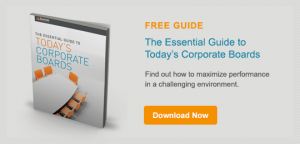Focusing Corporate Boards on the Talent Agenda

It is quite refreshing to hear that corporate boards are finally turning their agenda toward talent. Institutional investors are getting involved in the topic of talent. Corporate boards are starting to engage on talent issues. At least half of boards are talking about talent management and the human capital agenda, but data shows that boards are clearly not there.
Why the A New Focus
Corporate boards are called on to provide guidance on growth and innovation, and talent is key part of that. A successful people strategy is critical to compete. Talent is a fundamental differentiator for success and has become a primary driver of long-term value creation, not to mention mitigating human capital risk. There is a trend toward the board expanding discussions, but the topic is spread quite evenly regarding who is addressing it – the full board or a specific committee. Regardless of where the responsibility lies, all board member needs to pay attention to talent. Companies will be tested on whether they are actually putting people first.
The nature of talent of agenda is focused on investments that are being made, employee training and diversity, as well as employee experience. The board will look at the company’s ability to pivot quickly and whether the workforce is flexible enough the handle that pivot. The board must also keep in mind the continued evolution of the workforce. Discussions regarding strategy, operations and talent must be linked together and the discussions should be held further upstream. The board must focus on where value is created in the organization and specifically in areas of innovation and growth. Where there is a gap, then it needs to be built.
The Priorities
Establishing and ensuring a unique competitive advantage should be focused on culture and leadership. The board needs to think about how talent plays into risk, strategy, innovation and governance. The discussions should happen with CEO in the executive session as well as audit, compensation committees. The board and the CEO need to ensure they have capabilities for today and for tomorrow to compete. In merger and acquisition scenarios, board should screen top leadership of a merger or acquisition target.
Boards can enhance their talent oversight by having a good sense of the culture of the organization and specifically on the way things happen and the way things get done. The board must understand the organization’s ability to flex and pivot when needed. Furthermore, the board must be clear on the employee experience. The board must challenge leadership on where the organization may need to over time bring in news skills. It must be clear to the board that they understand where management is going to address those skills gaps.
The Challenges
The board agenda is already very jammed packed, so it is hindering the amount of attention on the topic. From a board skillset perspective, a majority of corporate boards lack expertise in succession planning, talent management and compensation which is typically found in Chief Human Resources Officers (CHRO’s). Besides, General Counsels, one of the largest gaps in board composition and skill set is related to the CHRO.
With the aggressive pace of this market, digitization and automation cannot be ignored. New jobs and skill sets will be created, and it is changing at a phenomenal rate. The labor force is changing. Employees are becoming consumers with higher expectations of their employers. To execute on a business strategy, the board must also focus on the workforce strategy. The reason that this is so important is that we now live in a world of innovation.
Investors want to see that there is a focus on customer loyalty and the importance of company purpose. The board should engage by focusing on looking at all three areas – operational performance of the company, strategy and talent. Metrics must be set and driven by the corporate strategy. If anything, the board should engaged on workforce mix and where the supply will come from. Lastly, adaptability must be built into the organization.
Next … we must turn the talent agenda toward the actual skills sets and composition that are around the boardroom table itself!

Comments